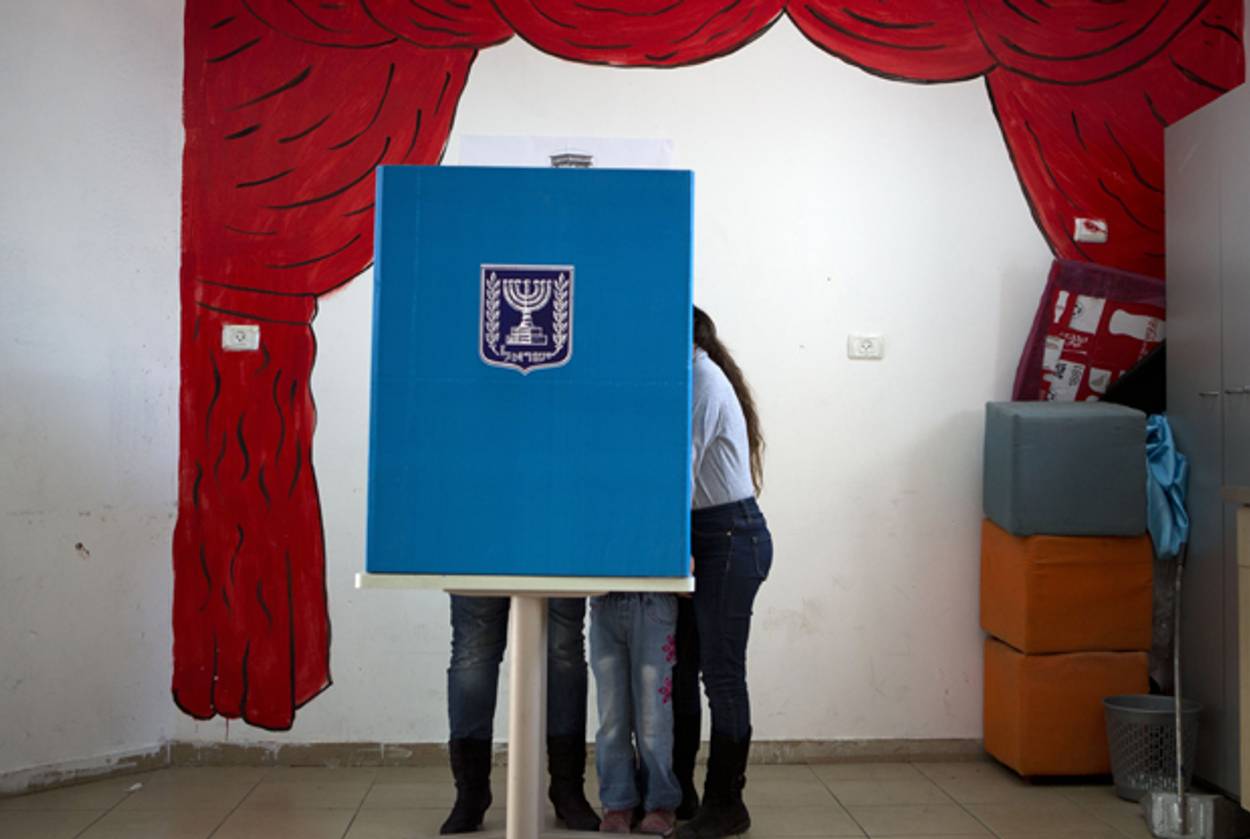My Son’s First Election
My 7-year-old told me to vote for the party that ‘gives the most peace,’ but there were none on offer in Israel’s election




We ended up going to vote in the morning. We’d planned to do it in the afternoon, after a visit to Grandma. But Lev, our 7-year-old son, was so excited and impatient that I suggested to my wife that we go early in the morning and get it over with. So we set out at 7, and as we walked in the still-cold street, I recalled the first election I went to with my parents.
It was after the Yom Kippur War. We went together, but they didn’t make a big deal of it. They took me because they didn’t have a babysitter, or something. I was proud of them when we went behind the curtain together. They seemed to be taking the whole thing seriously, searching patiently for the right ballot and putting it in the envelope. I could see that they were trying to choose what would be best for our country, for my future. And I knew that there was no one else in the world who knew how to vote better than my mother and father. I didn’t know then that, within three years, Israel would win the Miss Universe pageant, the European basketball championship, and the Eurovision Song Contest. That we’d free the Entebbe hostages in a daring operation. I didn’t know any of that at the time, but the smell of a rosy future was in the air. And when my parents dropped their envelopes into the ballot box, I knew we were one step closer to that future.
The feeling is completely different at the 2013 elections. The Iranian threat looms large, the international isolation Israel has brought on itself by making inflammatory decisions like the one to expand settlement building, or to attack the Turkish flotilla, is only growing worse. And it’s recently come to light that the country’s deficit is actually 40 billion shekels, not 20 billion, as the Treasury Minister promised us. But despite all those existential problems, the people seem to be totally indifferent to these elections. Our neighborhood friends seemed more anxious about the results of the Master Chef finale than about this sleepy election. It’s as if our fate has already been sealed, and electing a prime minister is like choosing the captain of the Titanic after it has already struck the iceberg: The ship’s filling with water and it’s starting to list, so what does it really matter who’s at the wheel?
“A Strong Prime Minister–A Strong Israel,” Netanyahu’s campaign slogan is plastered on a billboard we pass on the way. Not “A Smart Prime Minister” or an honorable one, or a good one. Just a strong one. Without hope, but with the clearly implied promise of another round of violence on the way.
In the makeshift poll located in a nearby elementary school, I search all my pockets for my identity card, and for the first time, Lev asks what party I’m voting for. I ask him which party he thinks I should give my vote to, and after thinking for a second, he shoots back at me: “The one that gives the most peace.”
“That sounds like a great way to go,” I tell him, “except that, I’m sorry to say, almost none of the parties in this election are giving peace or even the hope of it.” Lev thinks a while longer and says that if that’s the case, maybe I should vote for the party that gives the most money. I try to think of one like that—a party that gives money to everyone, not just to the people who are rich to begin with, or to the ultra-Orthodox, or the settlers. Lev picks up on my frustrated expression and offers another suggestion. “So vote for the nicest one,” he says. But there are very few nice ones in this election. Which is strange. Because I’d expect elected representatives who can’t offer peace or decent lives to the people who have to work two or three jobs, to at least be nice.
“So vote for the least-crappy one,” Lev says, prepared to keep lowering the bar. I nod and give my identity card to the plump lady who explains what’s written on the voters’ information page. Then I go behind the curtain and choose the ballot of the party I believe is the least-crappy one. That was good advice my son gave me. The smart advice of a 7-year-old who still hasn’t had time to forget that you can try and choose a good party, believe that it exists. Maybe if they gave 7-year-olds the right to vote, things would be different in this country. And leading it would be people who offer a bit of peace, or at least the hope that peace is possible, who give a little more money to the country’s citizens and not just to their cronies. But 7-year-olds still don’t have the right to vote, and what they know, the last few years have caused almost all of us to forget.
As I drop my envelope into the ballot box and try to give Lev the same smile my parents gave me almost 40 years ago, I can’t shake the fear that, in the end, most of us will still elect the crappiest one, the one that never offered us a single centimeter of hope.
Translated by Sondra Silverston
***
Like this article? Sign up for our Daily Digest to get Tablet Magazine’s new content in your inbox each morning.
Etgar Keret is a Tel Aviv-based filmmaker and fiction writer. He writes a regular column from Israel for Tablet.
Etgar Keret is a Tel Aviv-based filmmaker and fiction writer.